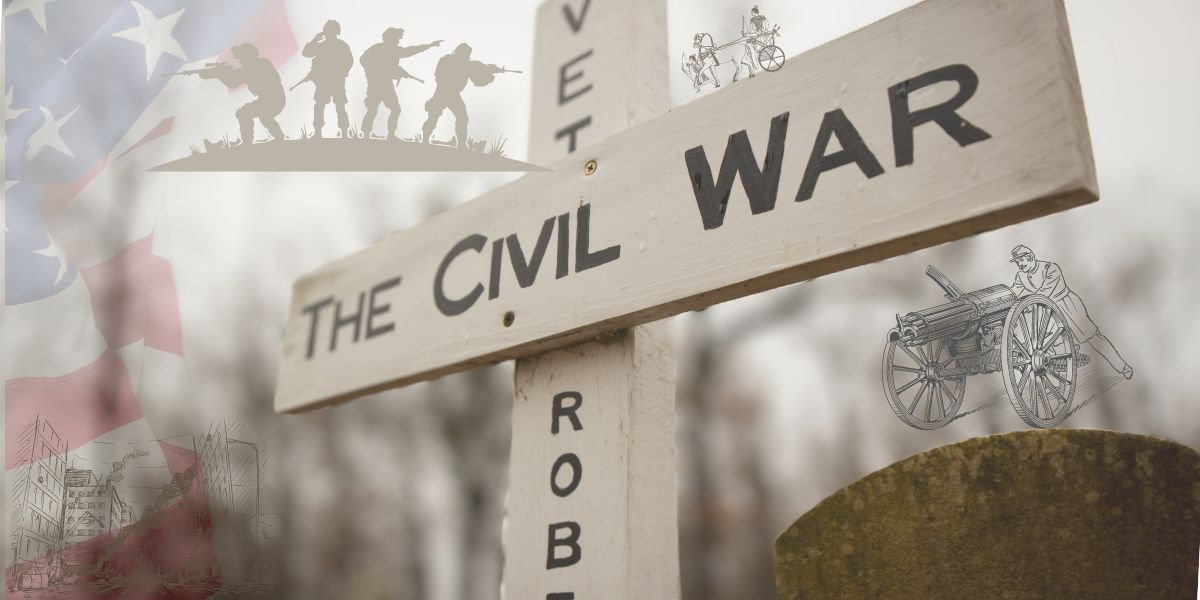The American Civil War, one of the most pivotal events in the history of the United States, was a bloody conflict that tore the nation apart. This devastating war went on from 1861 to 1865 and had a lasting impact on American society and politics. Here we’ll look at why it happened, the important people involved, the big fights, and what happened after.
What Started the American Civil War?
The American Civil War started because of many complicated reasons that had been building up for a long time. The primary cause was the divisive issue of slavery. As the Northern states began to embrace abolitionism and industrialization, while the Southern states wanted to keep using slaves to work on their farms. The disputed debate over the expansion of slavery into new territories fueled tensions between the North and South, and this eventually led to the war.
Causes
While slavery was the prime cause of the American Civil War, there were several other factors that contributed to the escalating tensions. Economic differences between the industrialized North and the agrarian South, political disputes over states’ rights versus federal authority, and cultural differences all played a role in the eventual eruption of conflict. When Abraham Lincoln, who was against slavery, became the President, things got even more divided, ultimately pushing the nation toward war.
Key Figures and Leaders in the American Civil War
The American Civil War saw the rise of numerous influential figures who played vital roles in shaping the outcome of the conflict. On the Union side, Abraham Lincoln led the country and played a crucial role in keeping the US nation together. Generals like Ulysses S. Grant and William Tecumseh Sherman were smart in their strategies and helped their sides win. On the Confederate side, General Robert E. Lee was really good at fighting, and President of the Confederacy Jefferson Davis led the Southern states that broke away. These key features and leaders left a strong mark on the war’s path.
Major Battles and Events During the War
The Civil War was characterized by a series of major battles and events that shaped its outcome. The Battle of Gettysburg fought in July 1863, marked a turning point in the war as Union forces successfully repelled Confederate advances. The Battle of Antietam was really bloody and gave the North a good win. Other notable battles include the First Battle of Bull Run, the Battle of Shiloh, and the Siege of Vicksburg. These battles, along with countless smaller fights, demonstrated the brutal nature of the conflict and the determination of both sides to win.
Casualties and the Impact on Society
The American Civil War led to a lot of people dying and changed US society a lot. It is estimated that more than 600,000 soldiers died, and many others got hurt or went missing. The staggering loss of life left families really sad, and communities in mourning. The war also made big changes in society, especially in civil rights. The Emancipation Proclamation, issued by President Lincoln said slaves in the South were free, which was a really important moment. This set the stage for ending slavery and fighting for equal rights in the U.S.
Life During the War
Life during the war between the states was marked by hardship, uncertainty, and sacrifice. Soldiers faced grueling conditions on the battlefield, enduring long marches, disease, and being afraid of death. Civilians also experienced hardships, as they dealt with shortages of food, clothing, and other essential goods. Women played a vital role during this time, taking on new responsibilities and supporting the war effort in various ways. The war changed how people lived every day and had a big impact on the whole country.
The Aftermath of the Civil War
The US Civil War ended in 1865 when the Southern side (Confederate forces) surrendered. After the war, the country had to rebuild and heal, which we call “reconstruction.” In 1865, a law called the 13th Amendment was added to the U.S. Constitution. This law made slavery illegal, but even though the war was over, things were still really hard. The time after the war had lots of political fights and struggles for equal rights, especially for African Americans who were now free.
In conclusion, the American Civil War was a defining moment in US history, that changed the US nation a lot. From its complex causes to the key figures and battles that shaped the conflict, the war unleashed a wave of destruction and transformation.
